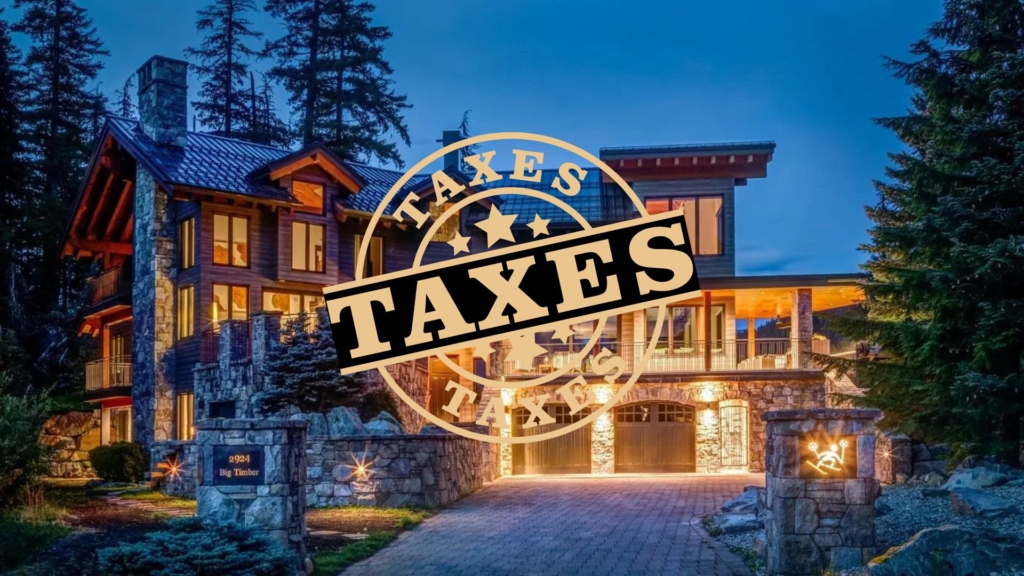Let’s discuss the different Whistler property tax rates for different home types and how you can minimize property taxes.

Table of Contents
Understanding the tax differences between property types in Whistler can save you thousands of dollars and prevent unwelcome surprises. With property assessments climbing and tax bills following suit, knowing how your specific property is taxed has never been more important. Let’s break down what you need to know about Whistler property tax based on whether you own a primary home, vacation property, or investment rental.
Understanding the Whistler Property Tax Framework
BC Assessment evaluates all properties annually, with assessments reflecting market value as of July 1 the previous year. Your Whistler property tax is calculated by multiplying this assessed value by the applicable tax rates (mill rates).
The Resort Municipality of Whistler (RMOW) sets municipal tax rates, while the province determines school tax rates. These combine to form your total property tax bill. For 2025, residential properties face a combined rate of approximately 2.5 per $1,000 of assessed value.
Property tax bills are mailed in May each year, with payment due by the first business day in July. Late payments incur a 10% penalty, so mark your calendar.
Beyond these basic taxes, the provincial Speculation and Vacancy Tax may apply to certain properties, adding another layer to your tax considerations.
Residential Property Tax Considerations in Whistler
Your “principal residence” is where you live most of the year, receive mail, and are registered to vote. This designation matters because it qualifies you for significant tax benefits.
When buying a primary residence, you’ll face the Property Transfer Tax (PTT): 1% on the first $200,000, 2% on the portion between $200,000 and $2 million, and 3% on amounts above $2 million. First-time homebuyers may qualify for a full PTT exemption on properties under $500,000.
As a primary resident, you can apply for the Home Owner Grant, which reduces your property taxes by up to $570 (or $845 for seniors). You must apply annually by July 1 through the provincial government website.
To claim these benefits, you’ll need proof of residency such as driver’s license, tax returns, and utility bills. Keep these documents organized for potential audits.
Vacation Homes: Additional Property Tax Implications
Vacation properties in Whistler face different tax treatment than primary residences. The classification affects both your annual property taxes and one-time purchase costs.
Second homes often face higher tax rates than primary residences. And if your property sits empty most of the year, BC’s Speculation and Vacancy Tax (SVT) adds 2% of the assessed value to your annual tax bill.
You can avoid the SVT by:
- Using the property as your primary residence
- Renting it for at least six months of the year (in 30+ day increments)
- Meeting specific exemption criteria
If you use your vacation home for short-term rentals, you’ll need a business license from RMOW and may face commercial tax rates in some zones. Short-term rental use won’t exempt you from the SVT unless it meets minimum thresholds.
Investment Properties and Whistler Property Tax
Investment properties in Whistler are those purchased primarily to generate income through rentals. When buying, you’ll pay the standard PTT plus an additional 2% on amounts over $3 million.
For tax purposes, you must report all rental income on your annual income tax return. But you can deduct expenses like:
- Property management fees
- Maintenance and repairs
- Mortgage interest
- Property insurance
- Utilities (if you pay them)
- Travel costs for property management
GST/HST registration becomes mandatory if your short-term rental income exceeds $30,000 annually. Long-term rentals (over 30 days) are GST/HST exempt.
Empty homes face stiff penalties through the SVT. Maintain detailed rental records to prove occupancy if audited. Even partial-year rentals can reduce your tax burden.
Strategies to Optimize Your Whistler Property Tax Liability
Consider timing your property purchase for after July 1, when the assessment year rolls over. This gives you nearly a year before your first full tax bill.
Document your property use meticulously. For vacation homes, keep records of personal use days, rental days, and maintenance periods. For investment properties, maintain detailed rental agreements and payment records.
Review your assessment notice carefully each January. You have until January 31 to appeal if you believe the valuation is incorrect. Many successful appeals result in lower tax bills. Understanding tax implications can significantly impact your overall investment returns.
Tax deferral programs exist for seniors and families with children. These allow you to postpone property tax payments (with interest) until you sell the property.
But don’t go it alone. Tax laws change frequently, and the penalties for mistakes can be severe. Consult with a tax professional who understands Whistler property tax nuances.
Conclusion: Make Informed Decisions to Mitigate Whistler Property Tax
The tax differences between residential, vacation, and investment properties in Whistler can amount to thousands of dollars annually. Primary residents enjoy the most benefits, while vacation homeowners face additional levies unless they maintain sufficient occupancy.
Investment property owners can offset higher taxes through careful expense tracking and proper rental management. Regardless of your property type, staying informed and planning ahead will minimize your tax burden.
For the most current Whistler property tax rates, check the RMOW website directly. Review your assessment notices promptly each January, and consider consulting with a tax advisor before making major property decisions.And if you’re looking to buy or sell in the Whistler area, contact our real estate team for guidance that accounts for these important tax considerations.

